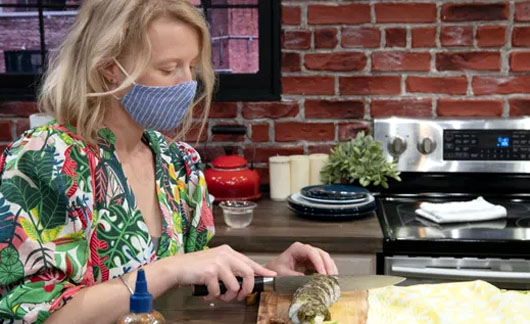By
June 21, 2021
-World Tribune
NBC News, which has been biting at the chomp to gallop past CNN in the Woke Network Derby for some time now, is serving up its latest soulless globalist fare. And we mean that literally.
NBC wants America to eat its bugs.
“Newsflash, America: Almost everybody eats bugs but us,” the June 20 piece posted in the network’s “Health & Technology” section of its website begins. Cortni Borgerson, a professor of anthropology at Montclair State University, is the author. Taxpayer-funded NPR calls her a “cicada enthusiast” – that’s a gastronomical reference, not an entomology note.
Borgerson’s NBC piece is predictably chockful of rebukes of burger-loving Westerners for failing to be good world citizens and munch on insects like so many other more evolved cultures do.
“It may have surprised you to read about how the large Brood X cicadas, emerging after 17 years underground, make for a delicious meal. But in fact, insects are a staple of diets around the world, and we’re just catching up,” Borgerson writes.
Not buying it? Borgerson and NBC are here to inform you that you are the weird one:
Other cultures have known how enjoyable insects are for millennia. Today, 2,000 species are eaten by more than 2 billion people. In every corner of the world, people are dining on bugs like sakondry, mopane, grasshoppers and, of course, cicadas. Many cultures even consider them a delicacy — because they are.
And, really, you don’t know what you are missing out on:
And most of the edible bugs you’ll encounter actually taste really good. I promise. Cicadas have a nutty, pork-like flavor — if you prepare them a certain way, they can even resemble a giant meaty sunflower seed. Sakondry are known as “the bacon bug” because they actually do taste like bacon. Chapulines (grasshoppers) have the flavor of a sweet, smoky tender jerky with a crispy chicken skin exterior. Green ants have a zesty quality.
You’d be surprised how quickly you’ll forget about a tender ribeye after you’ve chowed down on a plate full of crawling caviar:
There’s also none of that squishy stuff you might associate with eating an insect. Their texture is like other meats when cooked, and their legs and wings crisp up in the heat like chicken skin. It’s just meat; an often-overlooked meat that’s one of the keys to creating a sustainable food system. So, if they’re good for the environment, good for you, and taste great, why haven’t they caught on in America until now?
This question is the cue for the Western Civilization bashing and pandering to an idealized “global south” societal structure. “[D]ifferences in food cultures have often been used to reinforce cultural identity and stereotype the people and cultures in warmer climates,” Borgerson asserts.
The usual arguments about “sustainability” and saving the planet are also trotted out. But underlying it all is the overarching theme that having Americans eat bugs will move the planet one step closer to that united global village so cherished by our Elites:
Our recognition of the interconnectedness between our health and that of the planet is increasing. And where we once might have used novel foods to distance ourselves from “others,” our food culture is now defined by the very diversity that makes this country great.
It’s easy to laugh all this off but a hallmark of social revolutions throughout history is the politicization of every aspect of human existence. Nothing will remain outside of the circle of transformation. And so it will be with food. Borgerson has a vision of a future she believes is just around the corner. It shows just how deep the systemic change will run:
[W]e are turning the corner. It won’t be long before you’re seeing frozen insects in your local supermarket and munching on a bowl of bugs at your local bar. Or, if you’re like me, packing a bag of cicadas in your kids’ lunchboxes.
There is an implied threat behind that paragraph: You won’t be able to avoid this. It will reach into your everyday life.
Ridiculous? Well, what if someone had told you just two years ago that you’d be wrapping your mouth and nose in a microfiber diaper every time you ventured out of your home to buy toilet paper or toothpaste for over 12 months?




